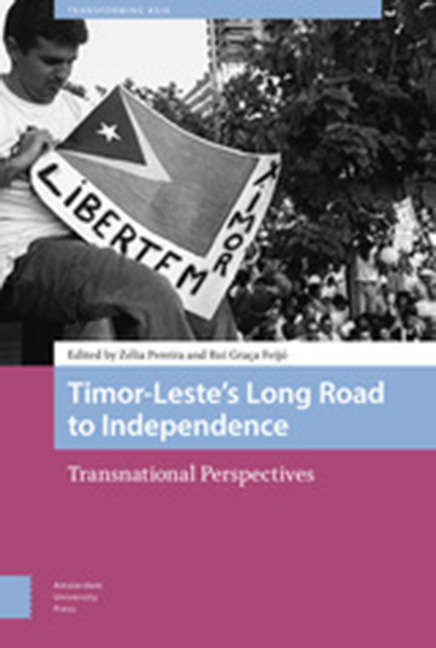Book contents
- Frontmatter
- Contents
- Acknowledgements
- A Note on the Name of the Country
- List of Figures
- Introduction: Timor-Leste’s Long Road to Independence: Outline for an Analytical Framework
- Part One Before The Portuguese Decolonisation
- Part Two The Portuguese Revolution Arrives In Timor-Leste
- Part Three Reaction To The Indonesian Invasion Of Timor-Leste
- Part Four Resisting The Indonesian Annexation Of Timor-Leste
- Index
7 - “Damned If You Do, Damned If You Don’t”: Portugal, the UN and the Timor-Leste Issue
Published online by Cambridge University Press: 14 February 2024
- Frontmatter
- Contents
- Acknowledgements
- A Note on the Name of the Country
- List of Figures
- Introduction: Timor-Leste’s Long Road to Independence: Outline for an Analytical Framework
- Part One Before The Portuguese Decolonisation
- Part Two The Portuguese Revolution Arrives In Timor-Leste
- Part Three Reaction To The Indonesian Invasion Of Timor-Leste
- Part Four Resisting The Indonesian Annexation Of Timor-Leste
- Index
Summary
Abstract
This chapter offers a survey of the UN's role regarding Timor-Leste's decolonisation. Starting with the first anti-colonial resolutions by the General Assembly in 1960, the analysis extends to 1982, when the UNGA entrusted the issue to the good offices of the secretary-general. It focuses on the Portuguese attempts to keep the issue alive in the international arena after 1975. The chapter stresses that Portugal moved from being staunchly opposed to UN directives on decolonisation, and thus politically isolated (before 1974), to being a champion of the right for self-determination for Timor-Leste (after 1975), a stance that resulted in its unexpected isolation once again. The chapter also addresses how several countries voted in the UNGA, showing that realpolitik induced a sharp contrast with the stated goals of international law, namely regarding self-determination.
Keywords: Portugal, Indonesia, United Nations, decolonisation, selfdetermination, UN General Assembly
From a Minor Issue in Portuguese Colonialism to an International Question
The United Nations played a central role in the world arena when the colonial empires began to crumble in the second half of the twentieth century, leading to a wave of independences in Asia and Africa (Luard 1989). Portugal as a colonising nation would not be immune to the decolonisation process and to the mounting international pressures to grant its domains the right to self-determination (Martins 1995; Santos 2017; Jerónimo and Monteiro 2020). Up to the end of its authoritarian regime – the so-called Estado Novo – Portugal resisted all the UN resolutions on the right to self-determination and independence as applied to the territories it had under its belt, which were considered by the UN as “non-autonomous.” Portugal argued that, after a constitutional reform, they were “overseas provinces” of a unitarian state, and thus should not be considered in the way the UN was imposing (Jerónimo and Costa Pinto 2015). After the Carnation Revolution of April 25, 1974, the new political and military leaders implemented a U-turn in the country’s approach to this issue and initiated a decolonising process which, however, they preferred to carry out without the involvement of the UN, although its principles were upheld, opting to negotiate the transfer of powers directly with the liberation movements (Pinto 2003).
This chapter focuses on the ways in which the Timor-Leste issue was dealt with at the UN, from the moment Portugal was admitted to the organisation in 1955 till 1982.
- Type
- Chapter
- Information
- Timor-Leste's Long Road to IndependenceTransnational Perspectives, pp. 219 - 250Publisher: Amsterdam University PressPrint publication year: 2023

